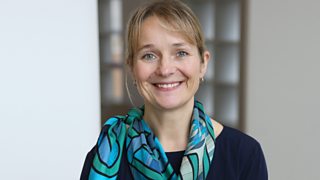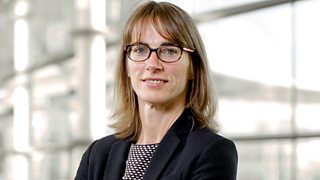The Life Scientific: Chi Onwurah
As a black working class woman from a council estate in Newcastle, Chi Onwurah was in a minority of one studying engineering at university in London and encountered terrible racism and sexism. She went on to build digital networks all over the world, including the first mobile phone network in Nigeria. Today she is the UK’s Shadow Minister for Science, Research and Innovation.
Jim Al-Khalili met her for The Life Scientific, and here’s what we found out.

Newcastle, Nigeria and back again
Chi’s father came to Newcastle to study to be a doctor, met her mother there and had children. Her older sister was born in Newcastle and Chi was born in nearby Wallsend. Shortly after her birth, the family moved to Nigeria. It was 1965 and the Biafran War was to break out shortly after – a civil war that caused mass starvation and the death of an estimated half a million to two million people. The chaos meant there was no powdered milk for Chi’s baby brother; meanwhile her mother had discovered a lump in her breast.
"Statistics showed me that I wasn't a freak, I was just on a scale of probabilities."Chi Onwurah
“So, we came back to Newcastle, as refugees really, on a cargo plane to Lisbon and then on a ticket – which we had to ask the British Embassy to pay for – from Lisbon to Newcastle.”
Safety in Numbers
Chi recalls the relief of her mother receiving treatment on the NHS and of having a school near the council house the family lived in. But there wasn’t much time to take a breather from the trials of life. “One of the things people often don't realise about poverty is what a full-time occupation it is trying to live on a really, really low income. We were on benefits for most of the time and that is something that marks you.”
The family suffered racism too, in the form of abuse but also attacks, such as having their windows broken or faeces smeared on them, and firecrackers put through their door.
While her brother and sister were anxious about integrating, Chi found solace in books. “I was very into science fiction, and I loved mathematics. Statistics showed me that I wasn't a freak, I was just on a scale of probabilities. That took me away from what we were experiencing at school and at home.”
University: a hostile environment
When Chi arrived at Imperial College, London to study electrical engineering, it was the mid-Eighties and the height of the anti-apartheid struggle in South Africa. Chi went on anti-apartheid marches and was a member of the movement’s national executive committee in the UK, an early milestone on her political journey. The context was also significant because Imperial had a School of Mines, and its intake was dominated by white South African men. “It was very, very racist and it was very, very sexist as well,” Chi says.

Engineering is the most caring profession because they are making life work better for so many people.Chi Onwurah
What shocked Chi most about the racism she experienced at university was that it would come from “people I was supposed to look up to” such as her lecturers. “In Newcastle no one in authority was racist,” she said.
Describing it as “the worst experience of my life”, Chi did consider leaving Imperial. She stuck at it – and is pleased she did – but she also fought back. “I wrote an article about the racism I was experiencing – particularly the rag mag, which had some horrendous jokes in it – for The Guardian newspaper. After that, things improved and there was more visibility of the issue of racism, though the lecturers and the professors felt that I was betraying them by going to the media about it.”
From Nortel back to Nigeria
Acknowledging the academic kudos of getting a Bachelor of Engineering degree from Imperial, Chi went on to work for the telecommunications company Nortel, at a time when the sector was on the cusp of the move from analogue to digital. Chi was working on ISDN (Integrated Services Digital Network), the first digital network. Her work took her to France, Denmark and the US.
After returning from the US, a former colleague contacted Chi and told her about Nigeria’s deregulated telecoms market and its capacity to roll out a mobile phone network. It was an exciting and massive challenge. Nigeria’s electricity network didn’t work constantly so, when Chi got involved, her job encompassed designing and building the network’s own power supply.
On a personal level, Chi’s achievement finally convinced her father that his daughter’s chosen career path was worthwhile!
“When I went to Awka, which is where we're from in Nigeria, I was able to hand him a mobile phone and say to him that, because I was managing the network rollout plan, I knew that in two months this mobile phone would work, and it was the first mobile phone in his village and he could call me on it. He was incredibly proud, and I was also incredibly proud. He actually said to me, ‘perhaps this engineering thing isn't so bad after all.’”
The private sector to public service
After her unique experience in Nigeria, Chi returned to the UK in 2004 to work for Ofcom. It was her first job in the public sector and Chi admits that it was culture shock.

“It took me about a year to get used to the language of what success was,’ she says. “I remember somebody saying something like, ‘it's a very interesting idea. We'll run it up the flagpole and see if anyone salutes, but we don't want to set any hares racing, do we?’ I thought ‘What do you mean, what's supposed to happen?’! I also think that in public sector you’re much more likely to be criticised than to be praised.”
Despite her private sector background, Chi, who became an MP in 2010, values the role of regulation in enabling “good businesses to work successfully”. She contrasts that belief with the anti-government, anti-regulation position of many of the big Silicon Valley companies and the consequent loss of trust that her constituents feel towards technology.
Political science
When Chi told her engineering colleagues that she was standing as an MP, the reaction she got was “disgust”. They asked her why anyone would leave “a reputable and useful profession like engineering for a disreputable and chaotic and dubiously useful non-profession like politics.”
However, for Chi, “science is political”, whether that is because of issues like regulation or funding, among others.
Of her colleagues in Parliament who have a science or engineering background, Chi believes they are “more likely to approach policy in a evidence-based way and more likely to be numbers literate, which is important.”
A bright future
Chi believes that there's a really positive story to be told about science and technology: “We have got to have a long-term vision and plan for how our economy is and science has to be part of that.
“I'm constantly amazed at the way in which everything we do, what we write, what we film, what we photograph, can be broken down into ones and zeros – because that’s what digital networks are, ones and zeros – and then put back together at the other end. That power is something we take advantage every second of the day now.
“Engineering is the most caring profession because they are making life work better for so many people.”
Listen to Chi Onwurah on The Life Scientific
More from BBC Radio 4
-
![]()
The Life Scientific
Professor Jim Al-Khalili talks to leading scientists about their life and work.
-
![]()
The Life Scientific
Naomi Climer, the first female president of the Institution of Engineering and Technology.
-
![]()
The Life Scientific
Formula One engineer Caroline Hargrove.
-
![]()
Any Questions?
John Elliott, Chi Onwurah MP, Guy Opperman MP, Dame Nicola Stephenson.




